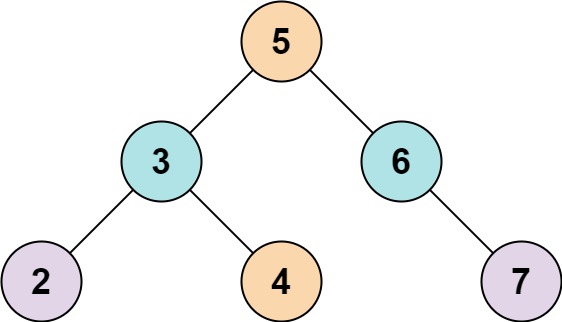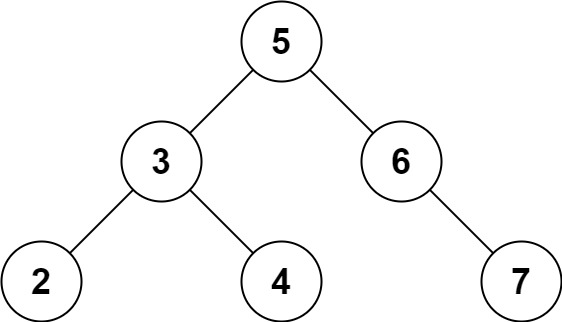| ID | Title | Difficulty | |
|---|---|---|---|
| Loading... | |||
653. Two Sum IV - Input is a BST
Easy
LeetCode
Hash Table, Two Pointers, Tree, Depth-First Search, Breadth-First Search, Binary Search Tree, Binary Tree
Problem
Given the root of a Binary Search Tree and a target number k, return true if there exist two elements in the BST such that their sum is equal to the given target.
Example 1:

Input: root = [5,3,6,2,4,null,7], k = 9
Output: true
Example 2:

Input: root = [5,3,6,2,4,null,7], k = 28
Output: false
Constraints:
- The number of nodes in the tree is in the range $[1, 10^4]$.
- $-10^4 <= Node.val <= 10^4$
- root is guaranteed to be a valid binary search tree.
- $-10^5 <= k <= 10^5$
Code
class Solution {
TreeNode root;
public boolean findTarget(TreeNode root, int k) {
if(this.root == null) this.root = root;
if (root == null) return false;
if (search(root, k - root.val)) return true;
return findTarget(root.left, k) || findTarget(root.right, k);
}
public boolean search(TreeNode node, int k) {
TreeNode curr = this.root;
while (curr != null) {
if (k > curr.val) {
curr = curr.right;
} else if (k < curr.val) {
curr = curr.left;
} else {
return curr != node ? true : false;
}
}
return false;
}
}
- Time Complexity: O(nh)
- Space Complexity: O(h)
- h is the height of the tree, which is logn at best case, n at worst case.
3
/
2
/
1
Searching in BST: For searching element 1, we have to traverse all elements (in order 3, 2, 1). Therefore, searching in binary search tree has worst case complexity of O(n). In general, time complexity is O(h) where h is height of BST.
class Solution {
public boolean findTarget(TreeNode root, int k) {
return helper(root, k, new HashSet<>());
}
private boolean helper(TreeNode root, int k, HashSet<Integer> set) {
if (root == null) return false;
if (set.contains(k - root.val)) return true;
set.add(root.val);
return helper(root.left, k, set) || helper(root.right, k, set);
}
}
按 <- 键看上一题!
652. Find Duplicate Subtrees
按 -> 键看下一题!
654. Maximum Binary Tree


